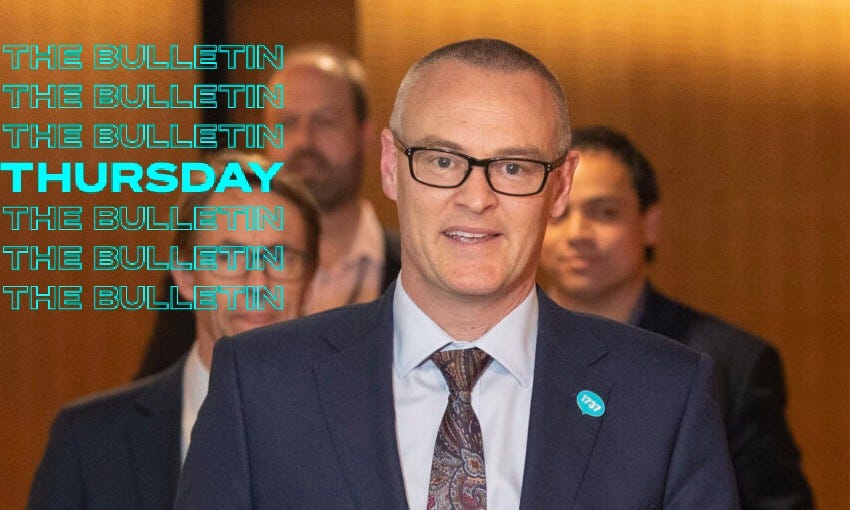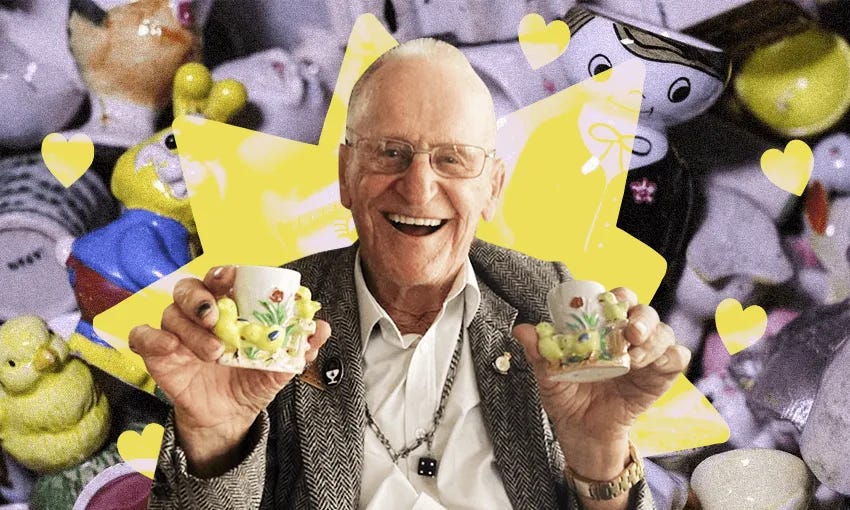Will the minister stake his job on cheaper groceries?
No, David Clark will not, but he will stake it on getting “a fairer deal for New Zealanders” at the check-out. But what does that mean and will we see cheaper cheese anytime soon?
Mōrena and welcome to The Bulletin for Thursday, July 7, by Anna Rawhiti-Connell. Presented in partnership with Z Energy.
In today’s edition: a shift in attitudes towards New Zealanders in Australia; Massey suspends psychology training course; climate commission recommends changes to farming emission plan; but first, we’re getting a grocery commissioner.
David Clark says he’ll stake his job on a fairer deal for New Zealanders at the check-out. (Photo by Mark Mitchell - Pool/Getty Images)
Grocery commissioner to be appointed
Announced yesterday by minister for commerce and consumer affairs David Clark, the grocery commissioner will be housed inside the Commerce Commission. They will have the power to issue warnings and issue fines which could be aligned to a percentage of supermarket turnover. The commissioner may not be in place until the first half of next year, with legislation being passed late this year. Hopefully it all moves faster and more effectively than the establishment and resourcing of the consumer advocacy council. As Newsroom’s Emma Hatton reports, the council was born out of the 2019 electricity price review but three years on, does not have any members or finalised terms of reference.
Commerce Commission CEO backs speed of moves but still believes there could be benefits to a break up of the duopoly
Clark made the announcement at the Commerce Commission and was joined by commission CEO, Jon Duffy. As Bernard Hickey reports, Duffy seemed impressed at the speed at which the government was moving saying “This sends a clear message to the supermarkets: they cannot keep making super profits at the expense of struggling consumers” but he also acknowledged it was a step on a journey to fix a broken market. When asked about whether he’d like to see the duopoly broken up, Duffy stalled a bit saying “what I personally think isn’t necessarily…’ and then diverted into the need for further work on the issue, saying there could be unintended consequences but also real benefits to that approach.
What does a fairer deal actually mean?
On RNZ’s Checkpoint last night, Lisa Owen asked Clark if he’d stake his job on cheaper groceries for consumers. Clark said he’d stake his job on a fairer deal for New Zealanders at the check-out. That rightly prompts a question about how that might be quantified. One might assume it could relate to a reduction in the cost of groceries. When asked at the press conference about whether it was fair for New Zealanders to be paying $18.60 for a block of cheese (a price which I will hubristically assume was retrieved from The Spinoff’s cheese price index), Clark was reluctant to get into the details of pricing. When asked whether we would see lower prices, Clark said we were already seeing the impact of closer scrutiny on the supermarkets. As Stuff’s Tom Pullar-Strecker reports, Jon Duffy cautioned people not to expect “immediate changes in prices in the stores”.
Bullying behaviour back in UK and Australia despite code of conduct
Clark also announced the launch of a five-week consultation process for a mandatory code of conduct between major grocery retailers and suppliers, which he said was to ensure suppliers got a “fair deal”. A code of conduct has been in place in Australia since 2015. There’s also been one in the UK since 2010. The consensus seems to be that they were making a difference in curbing bullying behaviour by the major supermarket players towards suppliers. But this report from the Australian Financial Review points to a return to that behaviour amid the price pressure caused by inflation. In the UK, a recent YouGov survey from the Groceries Code Adjudicator (which I imagine is similar to what our grocery commissioner will be) has found relationships between suppliers and retailers have deteriorated. In Canada, where the Green party of Ontario is pitching a grocery code of conduct, a food economist has said a code of conduct is “not a silver bullet to food price inflation".
A year’s free power could be yours! The Spinoff’s introducing a brand new weekly newsletter, Future Proof.
Every Wednesday, we will dive into what’s happening in the environment to keep you informed, empowered and inspired about our natural world, its challenges, and more importantly, the solutions.Future Proof is launching on Wednesday, July 13 and our partners at Electric Kiwi are offering a year’s free power* to one lucky subscriber! To enter, sign up to Future Proof now using this link – and go in the draw to win. We will announce the winner in the August 10th issue of Future Proof.
*Free power consumption up to the value of $3000 over 365 days. Must be signed up to Electric Kiwi within 60 days of winning. Full promotion T+Cs here.
Is the tide shifting on how New Zealanders living in Australia are treated?
As Stuff’s Luke Malpass reports, the availability of financial support for New Zealanders who live in Australia and have been affected by the flooding in New South Wales was specifically highlighted by the Australian government in an announcement on Tuesday morning. Prime minister Jacinda Ardern is currently in Sydney and said “I think it fundamentally represents a government that takes a different view to Kiwis in Australia and the contribution they make.” It’s expected that Ardern will discuss the rights of New Zealanders who live in Australia with Anthony Albanese. Ardern also, as described by the Herald, “fired a broadside” at Albanese's predecessor Scott Morrison, saying New Zealanders saw "pretty much the opposite" treatment under the former Morrison government.
Massey University suspends course required to become registered psychologist
As the NBR’s Maria Slade reports (paywalled) Massey University has suspended a training course which students must complete to become registered psychologists. The university is not taking 2023 enrolments for the Postgraduate diploma in psychological practice which, as Slade writes, is happening in the face of a chronic mental health workforce shortage. A ministry of health task group estimates New Zealand is currently short at least 1000 psychologists. Those wanting to join the profession will need to apply for places on other limited-capacity courses, move offshore, or try applying in 2024. As with all health workforce shortages, recent events have compounded the issue but these kinds of shortages have been well-flagged for some time. You can track back to 2002 in health workforce stocktake reports (as I did for a column last year) to find the warning signs.
Sharing is caring!
If you love The Spinoff and want to support us, one of the best things you can do is let a friend or relative know about us. Share this issue of The Bulletin with them and suggest they subscribe. Our newsletters are a great way to stay connected to what we’re about. Thanks for the aroha!
Climate Commission says farm emissions plan must be in place by 2025 but recommends changes
As Stuff’s Olivia Wannan reports, the commission has pushed back against several recommendations in He Waka Eke Noa, the farmer-designed emissions plan released last month. The commission has advised that synthetic fertilisers should be subject to the same charges applied to petrol, coal and natural gas under the Emissions Trading Scheme. The commission has also disagreed with the proposal to allow farms to count the carbon dioxide sequestered by on-farm vegetation, such as shelter belts and riparian planting. Writing in the report, commission chair Rod Carr said “We cannot afford to wait - any delay will only set us back further from getting to where we need to be in 2030 and 2050".
Click and collect
Stuff’s Kirsty Johnston looks at the efforts going into trying to lift vaccination rates for childhood illnesses.
Once again glued to the Guardian’s liveblog as Boris Johnson fights on and ministers assemble at No.10 reportedly to tell him to quit. Listening to the business news this morning, investors are already pricing in a resignation.
The Muslim community is seeking reassurances from police about their safety in the lead-up to Eid festival.
Submissions on Christchurch stadium plans overwhelmingly support carrying on.
$18m cost runovers estimated for Rotorua museum.
Got some feedback about The Bulletin, or anything in the news? Get in touch with me at thebulletin@thespinoff.co.nz
Last month, we published a story about 92-year-old egg cup collector Johnny Green's missing egg cup. Today, Alex Casey has an update. The pandemic brought with it ads and news stories trumpeting a dreamy $60 per hour for fruit pickers. Andrew Gunn accepted the call and experienced a different reality. A bunch of people went to see Thor: Love and Thunder, Taika Waititi's latest addition to the Marvel Cinematic Universe, and the reviews are in. Toby Manhire talked to Today FM's Lloyd Burr, who just got Covid for the third time. And if you haven't already, get to know the mind behind some of Aotearoa’s most beloved children’s characters in the brand new documentary Lynley Dodd: Writing the Pictures, Painting the Words.
Swap on after Reece Walsh’s departure from Warriors
Former Kiwis half Te Maire Martin will reportedly join the Warriors from the Brisbane Broncos in a swap-deal for departing fullback Reece Walsh. Warriors CEO Cameron George confirmed the early release of Walsh from his final year of his contract on compassionate grounds yesterday. "There has been a major change in Reece's personal circumstances in the past two months, which have impacted on his ability to move to Auckland with the club next season," said George.
Quick update on Erin Routliffe’s quarterfinals match at Wimbledon. Routliffe and her partner Alicja Rosolska lost 6-1 6-7 6-3 to the Americans Danielle Collins and Desirae Krawczyk overnight.
“This wasn’t just going to be a sports event, it was about our future”
For a long read today, ten years on from the 2012 London Olympics, the Guardian’s Oliver Wainwright takes a look at its legacy and whether it lived up to the promise of being “a model for social inclusion”. As Wainwright writes, Sebastian Coe, the chair of London’s organising committee, promised that the regeneration of the area in and around the Olympic park would produce 30,000-40,000 new homes, “much of which will be ‘affordable housing”. Since then just 13,000 homes have been built on and around the Olympic site. In the areas around the site there are almost 75,000 households on the waiting list for council housing.











